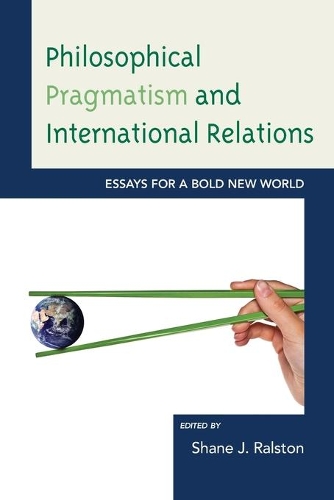
Philosophical Pragmatism and International Relations: Essays for a Bold New World
(Paperback)
Publishing Details
Philosophical Pragmatism and International Relations: Essays for a Bold New World
By (Author) Shane J. Ralston
Contributions by Brian E. Butler
Contributions by Matthew J. Brown
Contributions by Phillip Deen
Contributions by Loren Goldman
Contributions by John Kaag
Contributions by John Ryder
Contributions by Patricia Shields
Contributions by Joseph Soeters
Contributions by Eric Weber
Bloomsbury Publishing PLC
Lexington Books
27th March 2017
United States
Classifications
Professional and Scholarly
Non Fiction
Western philosophy from c 1800
327.1014
Physical Properties
Paperback
236
Width 149mm, Height 230mm, Spine 18mm
363g
Description
What are the implications of philosophical pragmatism for international relations theory and foreign policy practice According to John Ryder, a foreign policy built on pragmatist principles is neither nave nor dangerous. In fact, it is very much what both the U.S. and the world are currently in need of. Close observers of Barack Obamas foreign policy statements have also raised the possibility of a distinctly pragmatist approach to international relations. Absent from the three dominant theoretical perspectives in the fieldrealism, idealism and constructivismis any mention of pragmatism, except in the very limited, instrumentalist sense of choosing appropriate foreign policy tools to achieve proposed policy objectives. The key commitments of any international relations approach in the pragmatist tradition could include a flexible approach to crafting policy ends, theory integrally related to practice, a concern for both the normative and explanatory dimensions of international relations research, and policy means treated as hypotheses for experimental testing. Following the example of classic pragmatists such as John Dewey and neo-pragmatists like Richard Rorty, international relations scholars and foreign policy practitioners would have to forgo grand theories, instead embracing a situationally-specific approach to understanding and addressing emerging global problems. Unfortunately, commentary on the relationship between philosophical pragmatism and international relations has been limited. The authors in Philosophical Pragmatism and International Relations remedies this lacuna by exploring ways in which philosophical pragmatism, both classic and contemporary, can inform international relations theory and foreign policy practice today.
Reviews
These carefully crafted essays take the measure of current debates about international relations. They confidently guide their readers beyond the usual grand theories to a richly contextual approach that foregrounds tools of experimental inquiry. The contributors furnish ample evidence of the continuing relevance of classical pragmatism to some of the most urgent discussions of our time. -- Larry Hickman, Southern Illinois University
Author Bio
Shane J. Ralston is assistant professor of philosophy in the Humanities Department at Pennsylvania State University-Hazleton. His research is on democratic theory, pragmatism, international relations, and environmental philosophy. He is the book review editor for Education and Culture: The Journal of the John Dewey Society. He is also the author of John Deweys Great DebatesReconstructed and Pragmatic Environmentalism: Toward a Rhetoric of Eco-Justice.
